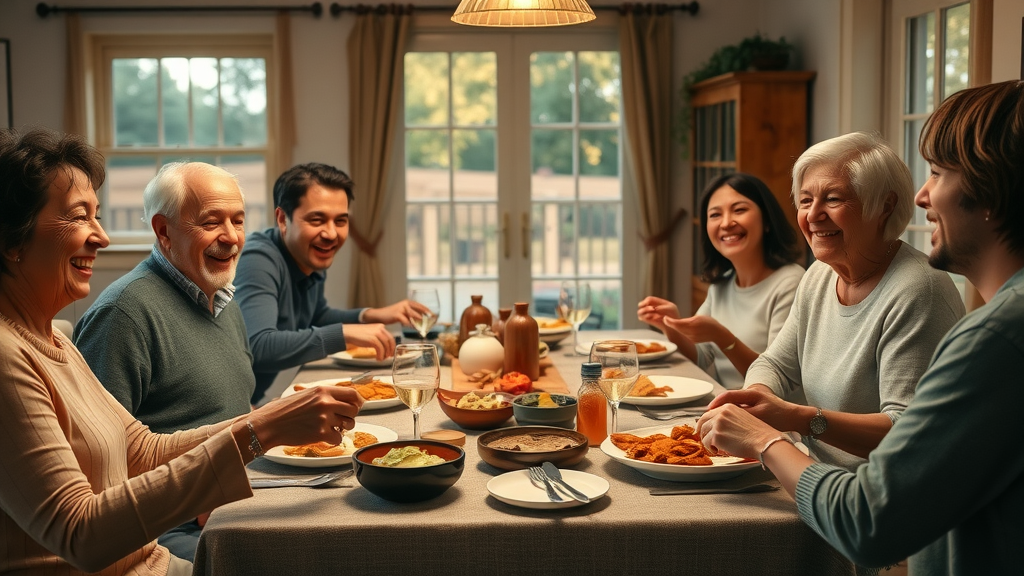-
Navigating the complexities of modern family and friend dynamics as a woman often feels both rewarding and challenging. Building healthy relationships enriches our lives, deepens our sense of belonging, and empowers us to become our best selves.

Understanding How Women Can Create Great Relationships with Family and Friends
-
Defining a healthy relationship for women
-
The impact of female friendships and male friendships on emotional wellbeing
-
Personal stories: How quality time shapes fulfilling relationships
-
What You’ll Discover in This Article
-
Key qualities of healthy relationships
-
Practical strategies to foster female friends and female friendships
-
Tips for addressing unhealthy relationship dynamics
-
Modern approaches to nurturing fulfilling relationships
How women can create great relationships with family and friends is a journey that weaves together emotional honesty, deep understanding, and daily acts of love. As women, we often act as the glue within our families and friendship circles, nurturing connections and investing countless hours into caring for those around us. But what truly defines a healthy relationship for women? In a world brimming with diverse personalities and evolving social norms, it’s essential to acknowledge that what works for one woman may not resonate with another. Healthy relationships, whether with family members or close friends, are built on trust, empathy, and the ongoing commitment to support one another.
The impact of female friendships and male friendships on our wellbeing cannot be overstated. Years ago, friendships may have revolved around shared experiences at school or neighborhood playdates. Today, adult life brings both freedom and responsibility, making intentional quality time even more valuable. I’ve witnessed—and lived—stories where just a monthly book club or a spontaneous coffee date transformed distant acquaintances into lifelong companions. As you read this article, you’ll discover practical advice, unique perspectives, and modern approaches to building and maintaining strong ties with those you love.
Essential Qualities of a Healthy Relationship for Women
-
Honest communication and trust as the foundation
-
How empathy and support influence healthy relationships
-
Setting healthy boundaries with family and friends
At the heart of healthy relationships lies honest communication and unwavering trust. These two pillars are more than buzzwords; they are living, breathing parts of any lasting relationship. When a woman feels safe to express her feelings with close friends or share her hopes with a family member, trust flourishes. Years ago, I learned firsthand that the ability to have open conversations—even the uncomfortable ones—is a good thing, as it empowers everyone involved and strengthens bonds over time. For many women, blending empathy and genuine support creates an atmosphere where personal growth and healing can naturally occur.
Empathy serves as the golden thread that links us together in both female friendships and male friendships. Suppose a friend is struggling with a new job, or a family member is navigating a tough time—when we offer understanding without judgment, we foster resilience and reduce the risk of unhealthy relationship dynamics creeping in. Equally important is the art of setting healthy boundaries . Boundaries define where you end and another person begins. When honored, they allow for fulfilling relationships because everyone feels respected and empowered to stay true to themselves.
"The best relationships are built on a foundation of trust and respect—qualities that empower women to strengthen their family and friend connections."

The Importance of Female Friendships and Female Friends
-
Unique dynamics within female friendships
-
Why maintaining strong connections with female friends supports mental health
-
Balancing vulnerability and self-care in female friendships
-
List: Common challenges and ways to overcome them in female friendships
Female friendships hold unique importance in a woman’s life. Unlike some male friendships, which sometimes focus on shared activities, female friends often bond deeply through emotional sharing and mutual vulnerability. Whether it’s reminiscing about high school days or confronting personal aspects of our lives, these connections foster understanding and solidarity. Supporting other women, and being supported in return, is a core element of our mental health and personal wellbeing.
Maintaining strong ties with female friends can be a challenge amidst busy schedules and shifting priorities. Yet, the benefits are boundless: reduced stress, improved self-worth, and a support network that can’t be matched by websites or apps. Many women find rituals such as weekly calls or regular meetups help maintain these close friendships. Creating space for self-care—like setting aside time to read, join a book club, or listen to a podcast together—allows each woman to nurture herself and her relationships simultaneously.
-
Scheduling regular “catch ups” despite busy calendars or different time zones
-
Navigating jealousy or misunderstandings by addressing concerns early
-
Celebrating one another’s milestones to reinforce bonds

Exploring Male Friendships and Expanding Social Circles
-
Understanding the nuances of male friendships for women
-
How meaningful connections with male friends contribute to healthy relationships
-
Addressing common misconceptions in cross-gender friendships
The value of male friendships in a woman’s social life is often overlooked. Many women benefit from friendships with men that are based on mutual respect, shared interests, and trust. These male friendships may look different than female friendships, sometimes revolving around activities—like meeting for coffee, watching a video together, or enjoying a sporting event. Yet, they provide unique perspectives and support that enrich a woman’s personal growth.
Meaningful connections with male friends can foster balanced, healthy relationships . By learning to appreciate different communication styles and interests and personal aspects, women can expand their social circles and develop a deeper understanding of themselves. It’s crucial, however, to address common misconceptions—such as assumptions that all cross-gender friendships lead to romance. Being clear about intentions, communicating boundaries, and focusing on shared values allows these relationships to flourish without confusion or concern.

Creating Fulfilling Relationships: Quality Time and Rituals
-
Why quality time matters for family and friends
-
Book club, shared hobbies, and traditions that deepen bonds
-
Practical examples: Reinforcing healthy relationship rituals
Quality time is the secret ingredient in both family relationships and friendships. Spending time together, even in small doses, fosters intimacy and builds lasting memories. Family dinners create opportunities to check in and support one another after a busy week, while a regular game night with close friends becomes something to look forward to every month. Rituals, whether simple or elaborate, deepen bonds and reinforce commitment.
Practical examples include forming a book club—where friends or family members pick a new title each month and discuss it over tea—or establishing Sunday evening phone calls with a sibling who lives far away. Years ago, a friend and I started a tradition of delivering handwritten letters for each other’s birthdays, which brought us closer through both humor and heartfelt messages. These rituals are flexible and can evolve, but their role in nurturing fulfilling relationships remains constant.
|
|
|
Comparison of Activities That Enhance Fulfilling Relationships |
|
Activity |
Family |
Friends |
|---|---|---|
|
Family Dinners |
Weekly, promotes conversation and shared goals |
Occasional, as a guest or host |
|
Game Nights |
Board games with all ages |
Strategy or party games |
|
Book Club |
Sharing personal stories and lessons |
Debating new ideas and interests |
|
Annual Traditions |
Holidays, reunions, or cooking together |
Trips, themed parties, or creative projects |

Signs of Unhealthy Relationships and Strategies for Change
-
Identifying red flags in family and friends relationships
-
How to address and heal unhealthy relationship patterns
-
Mental health self-checks and seeking support
Recognizing the signs of an unhealthy relationship is vital for protecting your emotional wellbeing. Warning signs include feeling drained after spending time with someone, a lack of trust, persistent negativity, or being unable to set boundaries without guilt. Whether you’re dealing with a family member or a close friend, it’s important to remember that these red flags signal the need for change, not resignation.
Addressing unhealthy patterns can involve difficult conversations, honest self-reflection, and sometimes seeking outside support—like talking with a therapist or mental health professional. Making time for periodic mental health self-checks helps you spot changes in mood, stress levels, or relationship satisfaction before they escalate. Don’t hesitate to reach out for help or suggestion from people you trust; healing often begins with asking for and accepting support of the purposes explained here.
The Transformative Power of Women’s Support Networks
-
Building safe spaces with female friends
-
How women’s circles foster resilient and healthy relationships
One of the most transformative aspects of modern womanhood is the rise of women’s support networks . These are safe spaces—book clubs, circles, or even online groups—where female friends can share, be vulnerable, and uplift one another. Building these networks requires intention, but the rewards are immeasurable. Moments spent in sincere group discussion often lead to personal growth, resilience, and new perspectives on what a healthy relationship looks like.
Women’s circles bolster mental health and nurture fulfilling relationships. They provide a sense of belonging and validation, encouraging everyone to bring their whole selves to the table. Whether you connect with others through local meetups, creative classes, or social media websites or apps, know that these supportive friendships can fundamentally change the course of your life.
"Supportive friendships among women can be life-changing, offering emotional refuge and inspiration."

Perspectives: How Modern Women Balance Family, Friends, and Self
-
Navigating generational expectations in female friendships and family relationships
-
The role of self-compassion and growth in fulfilling relationships
-
Tips for prioritizing mental health within relationships
Balancing family, friends, and personal needs is a modern challenge for many women. Generational expectations—how relationships were handled years ago versus now—often shape our beliefs about what a fulfilling relationship looks like. Today’s women are learning to blend tradition with self-awareness by redefining success not just as self-sacrifice, but as intentional investment in both their loved ones and themselves.
Practicing self-compassion is a cornerstone of healthy relationships. Growth happens when we allow ourselves to make mistakes, seek help when needed, and honor our interests and personal boundaries. Journaling, for instance, is a powerful tool for reflecting on our emotions and relationship dynamics. By tending to your mental health and acknowledging your feelings, you are better able to show up authentically for your family and friends.

Practical Steps: How Women Can Create Great Relationships with Family and Friends
-
Daily habits for nurturing healthy relationships
-
Simple strategies for resolving conflict with family and friends
-
List: Conversation starters and gratitude practices
-
Book club ideas and group activities for building connection
Creating great relationships as a woman begins with small, consistent actions. Daily habits, such as checking in on a relative, sending a kind message to a friend, or setting aside quality time without distractions, all play a significant role. When conflict arises—as it inevitably will—approach it with curiosity instead of accusation. Ask clarifying questions, listen deeply (active listening), and try to understand the other’s point of view. These methods, learned over months ago, can transform arguments into opportunities for growth.
Effective conversation starters include “What’s something good that happened to you this week?” or “How can I support you today?” Practicing gratitude together—by sharing a few good things at the dinner table or writing thank-you notes—amplifies positivity and connection. Group activities are also powerful: organize a themed dinner, plan a creative afternoon at a painting studio, or start a book club focused on shared interests and personal growth.
People Also Ask: How to Improve Relationships with Family and Friends?
-
Explore effective communication, active listening, and intentional quality time to foster stronger relationships. Shared activities like family traditions, book clubs, and digital meetups can bridge emotional distance and help create lasting healthy relationships.
Improving relationships with family and friends hinges on active participation and intention. Prioritize quality time and effective communication—say what you mean and listen to understand. Consider traditions like Sunday brunches, recurring book club meetings, or digital movie nights as tools to maintain strong, lasting relationship ties. Mutual respect and vulnerability open doors for deeper bonds, regardless of distance.
Don’t be afraid to introduce new rituals that reflect your group’s evolving interests. When everyone has a voice in setting these traditions, they become more meaningful. Consistently engaging in these habits, no matter how simple, fosters a sense of belonging that will last for years to come.
People Also Ask: How Does a Woman Contribute to a Relationship?
-
A woman’s contribution often includes emotional insight, empathy, nurturing, and the ability to foster a healthy relationship by promoting honest dialogue, celebrating others’ roles, and empowering family and friends to thrive together.
The unique contributions women make in relationships are often profound yet overlooked. Beyond everyday tasks and caregiving, women bring emotional insight—recognizing unspoken needs and feelings among those they love. This emotional labor is the foundation for nurturing, developing empathy, and creating environments where open communication and celebration of differences can flourish.
Perhaps most importantly, women empower family members and friends to become their best selves. They lead by example, demonstrating self-reflection, vulnerability, and accountability. By championing the successes of others and stepping back when needed, women create space for a fulfilling relationship for all involved.
People Also Ask: How Can I Enable an Individual to Maintain Positive Relationships with Their Family and Friends?
-
Offer encouragement to value open communication, support healthy relationship boundaries, and cultivate a positive, judgment-free space. Encourage participation in social groups, book clubs, or hobbies that nurture fulfilling relationships.
To empower someone to maintain positive relationships, start by modeling the behavior you want to see: be open, honest, and judgment-free. Help family or friends understand the importance of boundaries and encourage them to join group activities—like book clubs, cooking classes, or regular walks—that naturally foster connection and trust.
Support, in this context, isn’t about fixing problems for others but about reinforcing their confidence and ability to navigate complex dynamics. When women create safe spaces for each other—free of criticism and full of encouragement—the effect on their mental health and relationships can be monumental.
People Also Ask: How to Build Stronger Relationships with Friends?
-
Invest in quality time, express appreciation, address concerns early, and create shared goals. Attend to female friendships and male friendships with equal sincerity, reinforcing bonds for lasting, healthy relationships.
Building stronger friendships requires consistent effort and presence. Make it a habit to spend time with your circle, whether that means planning activities together or simply checking in with a quick message. Address issues before they escalate; honesty prevents resentment from taking root and keeps the foundation of trust solid.
Set shared goals like learning a new skill or taking a weekend trip, bringing purpose and fun to your relationships. Valuing both female friendships and male friendships equally leads to more balanced and rewarding connections over time.

Overcoming Unhealthy Relationship Challenges: Rebuilding Trust and Wellbeing
-
Steps for identifying and healing from unhealthy relationship patterns
-
How women can seek support and set new boundaries with family and friends
-
Mental health practices during difficult relationship transitions
Rebuilding after an unhealthy relationship takes courage, vulnerability, and time. First, acknowledge what wasn’t working—maybe there was a lack of trust, unresolved conflict, or emotional neglect. Reflect on your activity on this service of relationships, and seek the support of close friends, a mental health professional, or a women’s circle to guide your healing process.
Reestablishing boundaries with family and friends—such as carving out personal time, clarifying your needs, or stepping back from toxic dynamics—can provide space for both recovery and growth. Mental health routines like journaling, practicing mindfulness, or reaching out to a trusted confidant help steady you during relationship transitions.

Expert Advice for Maintaining Healthy Relationships as a Woman
-
Professional insights on fostering fulfilling relationships
-
Tips from psychologists on balancing mental health and connection
Relationship experts and psychologists agree: maintaining healthy relationships isn’t about perfection, but about showing up consistently and authentically. Practice small daily habits—like expressing gratitude, offering compliments, or being an active listener—to create a culture of mutual support. It’s also wise to recognize when professional help or group support is needed, normalizing mental health care as essential to relationship wellbeing.
You can further foster fulfilling relationships by hosting regular get-togethers, engaging in group hobbies, and seeking feedback from those closest to you. When conflicts arise, use them as a springboard for honest communication and deeper understanding, not as evidence of failure.
"Healthy relationships are not built overnight; they require patience, mutual effort, and self-reflection." – Relationship Coach
FAQ: Answers to Common Relationship Questions for Women
-
How do I address conflict in female friendships?
Approach conflict in female friendships with understanding and openness. Initiate a gentle conversation where both people can share their feelings without interruption. Use “I” statements to express your experience, and give your friend space to explain her side. Working together to find common ground prevents small misunderstandings from growing into bigger issues. Remember, all healthy relationships experience conflict—it’s how you handle it that matters.
-
What are the signs of an unhealthy relationship with friends or family?
Signs of an unhealthy relationship include frequent criticism, feeling manipulated or controlled, a lack of support, or being fearful to express yourself. Repeated negativity or lack of respect signals that boundaries are not being honored. Don’t ignore your instincts: if you feel emotionally drained after interactions, it’s time to reassess and set firmer boundaries.
-
Can book clubs and hobbies improve family relationships?
Absolutely. Book clubs, shared hobbies, or group passions bring family members together around a common purpose. These activities foster meaningful connection, create traditions, and anchor positive memories. They also provide structured opportunities for family members to share opinions, laugh together, and learn from one another in a safe and inclusive environment.
-
What role does mental health play in nurturing friendships?
Mental health is foundational to nurturing friendships. When you prioritize your wellbeing, you become a better listener, set healthy boundaries, and support your friends more effectively. Mental health awareness also encourages you to be empathetic toward others’ needs and creates a culture of kindness, openness, and resilience within your relationships.
Strategies for Deepening Connections in All Relationships
-
List: Top rituals and traditions proven to sustain fulfilling relationships
-
Integrating personal growth with communal experiences
-
Celebrating milestones with female friends, male friendships, and family
-
Establish a weekly family dinner or Sunday brunch ritual
-
Start a book club with friends or family to share learning and laughter
-
Mark birthdays, anniversaries, and achievements with home-cooked meals or creative outings
-
Join group hobbies, such as hiking or crafting, to deepen communal ties
Integrating personal growth—like setting new goals or exploring new interests—with group experiences brings greater meaning to relationships. Every milestone celebrated, whether a graduation, job promotion, or recovery from a tough year, strengthens the collective bond you share with both family and friends. Don’t shy away from commemorating these moments; they remind everyone that life, in all its ups and downs, is best experienced together.

Reflecting on the Journey: Empowering Women to Build Great Relationships with Family and Friends
-
Revisiting the core principles of healthy relationships
-
Encouragement to engage in self-discovery and growth with your loved ones
-
Call to action: Invite readers to share their personal experiences and strategies for how women can create great relationships with family and friends
The journey of how women can create great relationships with family and friends is ongoing—marked by honest communication, empathy, rituals, and a commitment to mental health. Every step you take, from joining a book club to learning new ways to celebrate your loved ones, adds strength to your web of connections.
Embrace opportunities for self-discovery, invite feedback, and keep growing together. I invite you to share your stories and the lessons you’ve learned about building great relationships—your journey could inspire someone else to take the next step toward a more fulfilling relationship .
To further enhance your understanding of building strong relationships, consider exploring the following resources:
-
The Power of Female Friendships: Building Strong Connections discusses the unique dynamics of female friendships and offers practical tips for fostering supportive relationships.
-
How to Make Female Friends (As a Woman) provides strategies for initiating and maintaining meaningful connections with other women.
These articles offer valuable insights and actionable advice to help you cultivate and maintain fulfilling relationships with family and friends.
 Add Row
Add Row  Add
Add 

Write A Comment